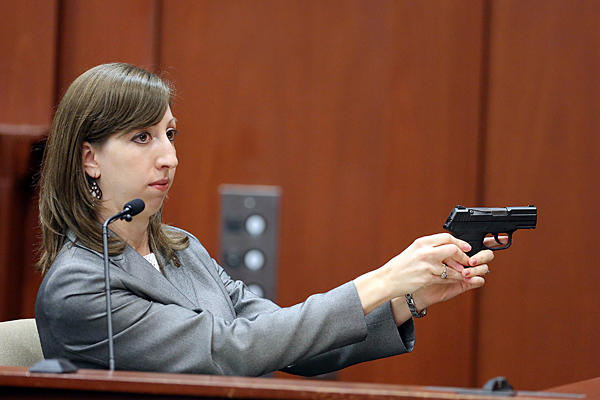This is going to be a post about George Zimmerman and Trayvon Martin. In other words, I may be part of the problem. But the problem is that there is a problem and ignoring perceptual reality in today’s society is like not existing at all. Perceptual reality, increasingly, as it has been for over a decade, is reality, or at least a sufficiently hefty chunk that it bears grappling with.
Here is your picture for this post:

I know why you think you care about the George Zimmerman murder trial. You think you care because of your sense of justice. You believe that this case says something about race in our country or whether you and yours have a right to defend yourselves, your neighborhood, your property, your livelihood, your freedom, or about what rights those who have less privilege among us actually can exercise and whether those rights are equal to those who have the most privilege. You believe that this case is a litmus test or a clarion call or a precedent or any number of the other things that we mistake court cases for in our society. You believe that justice is something meted out by judges with gavels in courtrooms. You believe that justice either was or was not done.
I believe that you believe any and all of these things (if you do) because you have been told to. Because the media has pumped these concepts and images into your brain to get you riled up into believing these things because it’s better than you thinking about larger issues of societal structure that affect the, y’know, actual reality.
I know I sound like I’m breaking out the tinfoil here. Bear with me.
There are myriad problems. I discussed last week why the media focuses on these kinds of dramatic race-baiting issues and brings them to the forefront in place of more systemic or larger societal issues. As alluded to in that post, you hear a lot about missing children. They are exclusively young white girls. Nearly a million people are reported missing in America every year. While most are found fairly quickly, a majority of those people are actually men and you can guess that the number of minorities is at least the statistical average percentage, if not disproportionately high. Now name or raise the issue of a single person you have ever heard of going missing who was not a young white girl. The girls they found in Cleveland earlier this year who were young but at least one was non-white don’t count, because they were only news (outside of Cleveland) because they were found, not because they were gone.
Now index all the names you know only because they were young white girls who went missing.
I’m not saying this is part of some vast conspiracy to get us to only care about young white girls. The problem is, most people care disproportionately about young white girls, either because we’ve been conditioned to find them the most attractive and vulnerable or because we actually do or some combination of them. Those related to young white girls also have the kind of money and influence you need to get your sob story in the media over the sob story of, say, a Pakistani woman whose entire family was just killed in a United States drone strike. And the media follows the audience, follows the dollars, then carefully augments and crafts the audience to create more dollars. It’s simple math. Simple, but profoundly insidious because it creates a perception of what kinds of people are and aren’t valuable in our society and how urgent a particular case that is actually relatively common is. This elevation of certain people over others is inevitable to an extent – we’re always going to have famous people and celebrities who enjoy more personhood than the rest of us – but it’s damaging when it creates a misperception about the nature of certain realities in our society, such as how many people go missing and what they look like.
Which brings us to George and Trayvon and the rapt attention they have commanded from America over the past weeks and into this very day, when social media is erupting in fence-building, line-drawing, and outrage outrage outrage. I’m not saying the verdict was right or the verdict was wrong. I’m not qualified to make that judgment, if for no other reason than I haven’t been drowning my attention in details of the case. Frankly, you and many of your cohorts may be just as qualified to make this judgment as the jury since you saw as many minutes of the trial as the jury did. Maybe you’re an expert and you know why this verdict was a travesty or a vindication. I can grant you that.
The mistake you may be making, though, is thinking, as this whole country does, that this case goes beyond this case. That this case sets a tone or a precedent for the whole society, enabling anyone to shoot down anyone they find suspicious. (Or, conversely, that it would have struck a blow against guns or racism had the verdict gone the other way.) This is the problem with a litigious society. We take what happens in one particular case, riddled with nuances and specificity and individual details, and cross-apply it to the whole world of laws, justice, and reality. All that was judged this weekend in Sanford, Florida, was what happened in this one particular instance. And not even one particular instance, honestly, but one shadowy legal interpretation of precisely what we can construct and admit about what happened in a particular instance.
There are two key distinct problems here – the cross-application of one case into a world of cases and the nature of what goes into a legal decision.
As far as the first, we can all be forgiven for making this leap. The court cases that are not murder trials that the media chooses to replace an entire 24/7 news cycle with which we follow most closely actually do set or change precedents. The entire legal system is founded on the baseline myth that we can interpret future interpretations of the law based on one we made in the past. I know a lot of you reading this are lawyers and aspire to be and are about to inundate me with protests of how precedent is the very backbone of legal theory, especially in a country with a Supreme Court. Yes, I know. This is the problem.
Most of lawyering, near as I can tell, is about mining the rich and over-documented history of law for cases that can be bent into seeming similar to yours and then finding favorable interpretations to proffer as precedent. And then people, be they judges overly steeped in legal theory or juries underly so, interpret the things you have offered as binding forethought and determine whether this holds water or not. Obviously this assumes that people were never wrong in the past, which is deeply problematic as a system, as well as assuming that past determinations are the most important factor in determining future behavior. Despite the fact that most of the world understands this to be one of the most baseline, if intuitively appealing, logical fallacies we can muster as a species.
And I know precedent changes and gets overturned all the time. But if so, why would it hold water in the first place? If tradition or past usage is a justification, but can be changed at will by courts, especially high ones, then what is this incredible weight we ascribe to tradition for its own sake? The only argument I could imagine is that it keeps the law knowable, but when we literally bar (get it?) lay people who have not paid their literal and figurative dues steeping their minds in arcane legal mystery from even approaching a courtroom to seek justice, how knowable is the law? I would submit, as I have in the past, that the law is literally unknowable – that no human being has the cognitive capacity to absorb the entirety of what we consider to be law in this country and apply that to daily living. The fact that we require our most well regarded and highly paid experts to navigate even rudimentary elements of this Law is a good indicator that this is true. You can’t possibly know the law when making daily decisions in your life, so precedent and past ruling should be no comfort.
At that point, while we know that the Supreme Court can whimsically choose which cases are worthy of possibly changing laws in our country and which are not, there’s nothing truly meaningful about the very concept of precedent, let alone its solubility in the long-term. To say nothing of the literal fallacy, even if you believe in legal theory and reject my critiques, of applying a non-Supreme Court case as a wider precedent to law and behavior. So other than in the perceptual media reality of exaggeration and the choice to focus on this case, there is no precedent of any kind being set by the George Zimmerman acquittal.
Nor, frankly, do these sorts of precedents make a lot of sense. You could argue that this case will ring in the back of someone’s mind the next time a member of the neighborhood watch of a gated community is confronted with an individual they find to be threatening. That they will be more inclined to shoot because Zimmerman wasn’t blamed for shooting Martin. I find this argument vaguely preposterous. The person is unlikely to think about long-term ramifications of their actions and rather be governed by fear, fight-or-flight, and their own personal moral backgrounds on killing, self-defense, desire to live, conflict resolution strategies, and so forth. If the long-term does enter their mind, they will realistically have to gauge the quality of lawyers they can afford, the absurdly low likelihood that their case will become even slightly noteworthy, and perhaps the nature of the local police and their likely gut-reaction to the incident, which will determine 95-99% of its outcome.
And if they are at all sophisticated about factoring in the Zimmerman precedent, they will also have to recognize that Zimmerman’s life is probably not going to be one they would want to survive to anyway. While he will not be imprisoned, the rest of his life will be dominated by this case and even the attempt to go underground and change his name will probably be thwarted by our corporate surveillance state. The best he can hope for is fame and book revenue from further publicizing the incident, but he will still be someone who half the country militantly regards as a murderer and will probably have to be nearly as fearful for his ongoing safety as he would have been in jail or on the night in so much question.
But the possibly more problematic question than precedent is the idea that what goes into a legal decision has anything to do with what the lay person would conventionally call justice.
There’s an increasingly common reality coming out of a lot of cases, most of them issues of corporate accountability and responsibility. One was documented in a recently rebroadcast NPR show about the suit of a casino that knowingly manipulated a gambling addict into owing them six or seven figures worth of money she didn’t have. Others arise every day in questions of manipulation, lying, cheating, and otherwise extorting people, the environment, or other common goods out of their money, property, safety, or health. This reality can be well summed up in this judgment from the transcript of the referenced show, a This American Life episode on blackjack:
From a moral standpoint, Caesars’ predation and prosecution of a pathological gambler is repugnant. … [But] [t]here is no common law duty obliging a casino operator to refrain from attempting to entice or contact gamblers that it knows, or should know, are compulsive gamblers.
Law is not about morality. It’s about the letter of the law being applied to a specific case. This is the system which we’ve constructed.
And many of you will think this is a good thing, because to you morality is whatever the Southern Baptist church says it is, and that means that gay marriage will always and forever be illegal and that would make you sad. Of course, no one has even been able to show what would be immoral about gay activity or gay marriage, and most of you are atheists who believe that there is a morality independent from God, yet whenever the word comes up you assume its most detrimental interpretation. I can’t understand this entire chain of logic, but if you believe morality can be separated from a hard-line originalist interpretation of religion, then what’s the problem with infusing law with morality? Why can’t these concepts have more in common than they do?
Many would respond that this is because morality can be individual and variable, whether there’s religion involved or not. Fair enough, but surely this is true of law and justice as well, especially as actually applied in a courtroom. Because at the end of the day, the written unknowable law doesn’t determine legal outcomes anyway. It’s just people. Flawed, human, mistakable people, making their own weird biased decisions.
I believe I’ve discussed here before the jury I served on in California a few years ago, involving a contract dispute between a sole proprietor who did events management and the quasi-non-profit who hired him to run an event. The case was really ambiguous and difficult and fascinating and hotly contested. And it hinged on one clear question: whether a sole proprietor signing his name to a signature as an individual also served as signing for his proprietorship or not. Did he have to sign twice, once for his business or once for himself? Or would just once work since it was a sole proprietorship, meaning he was basically the business?
(It just occurred to me, perhaps for the first time, how fascinating this question is in the context of corporate personhood… an aspect of the case I’d somehow never considered before. Ah well, for another time.)
Anyway, it was clear to most of the jury that this question was the hinge question for the case. If one signature counted for both, we’d side with the non-profit. If you needed two signatures, we’d side with the sole proprietor. But none of us felt qualified to make that legal determination. Surely there was something in the law library that could help us out. So we asked the judge to see the relevant statute so we could deliver the legally correct verdict.
We were all hauled back in from deliberation with the judge and both sides of the trial and their lawyers to have the question, which I’d phrased, read aloud by the judge. The judge then smirked and scolded us for asking it. He said he wouldn’t pull some statute from a law library even if the relevant one existed (he didn’t know – the law is unknowable!). He said that we’d been charged with making this decision, not the law. Whether one signature or two were necessary was up to us, not legislators or judges or even juries past.
So we voted, and on an 8-4 decision we decided that, in this case, two signatures were necessary. Largely because there had been two lines drawn up on the contract, one for the guy and one for the business, and the business one was blank. Had there been only one line, signed, we probably would have gone the other way.
Hopefully this case illustrates, at least a little, how variable and minute and interpretative the law is. And look, you may be a believer. You may look at my real-life parable and celebrate the wisdom of Jefferson and how the intent was always to have yeomen citizens deciding and interpreting the law on the daily and making flexible changes that went with the times and the individuality of every circumstance. Fair enough, perhaps. But confusing that process for some sense of “justice” seems misplaced to me. Justice is, as I understand it (it’s never seemed the most vital concept to me in the pantheon of lauded concepts, honestly) is supposed to be cosmic and righteous and ultimately fair. There’s very little of that in an individual decision hinging on a small biased interpretation of a few details. These jury decisions probably have almost as much to do with the hunger levels of the jurors and the past backgrounds of their own myriad flawed experiences as they do with some aspirational sense of justice.
So how can you confuse what American courts do with justice? Or injustice? I know we throw these terms around a lot, but is this even what the courts are attempting to do? I doubt it. They’re just trying to get things close enough to what seems legal (not moral, not necessarily even fair) at the time. And if the law says you can shoot someone because you’re scared, then they’ll try to uphold that. If the law says even the slightest nagging doubt in the back of your mind means you let the guy go, then they’ll try to uphold that. These jurors don’t want people to be able to shoot other people – these jurors are just hopelessly trying to apply an unknowable entity to an only partially knowable set of circumstances.
It’s a little like getting a bunch of people studying physics for the first time in their life to interpret a very complex set of circumstances and come up with some sort of equation to justify it. They’re in their first semester of physics and you tell them to write an equation for why a baseball flies off a bat in a certain speed, direction, and trajectory. They’re not going to be terribly sophisticated at doing this, they might get the question wrong, and in no way are they trying to do anything other than apply a set of rules within a given system (in this case, physics) to the circumstance they poorly understand (the baseball flying off the bat).
Now even this is probably a bad example because you’re likely less skeptical about the ability of physics to explain everything than I am. So let’s make the thing they’re trying to explain the existence of dark matter (something no one understands yet) instead of a baseball flying off the bat. We have no idea if physics can explain dark matter or if dark matter will rewrite physics. It’s unknowable and certainly not objective. But we’re asking these people to navigate the darkness and come up with the best equation to illustrate something we don’t know.
How could we possibly say if what they determine is right? Especially when the system we will use to help them is not a detailed course in physics from an objective perspective, but two angry professors arguing vehemently that physics is totally different than the other professor says it is? That they will present diametric and contrasting theories of physics and equations that both selectively take only a small portion of physics favorable to their side, then manipulate this information to their advantage? How on Earth could that system be confused for teaching or learning, let alone a moral outcome or even justice?
And yet we have structured almost our entire society around this system, willing to cede who lives and dies (literally, actually), who is free and who is tortured, who owes whom millions of dollars, all on this way of explaining physics.
It’s bad enough that so much hinges on these outcomes. It’s worse to magnify and augment that system by crediting it with also being a symbol of how the entire society views race or killing or guns or anything else that you care about. Do not misunderstand me – it’s good and right to care about those issues. Your passion is well-intentioned. But it is being badly manipulated by our legal obsessions and media motivations to create a firestorm. The media loves conflict, loves creating two polarized sides and exaggerating the differences between them. This is how you can be led to believe that George Bush and Barack Obama are polar opposites when they basically share beliefs and approaches on nearly everything that matters, something that is finally coming to a more common understanding after the revelations about the NSA. This is how you can be led to believe that there is political discourse in this country on real issues instead of shouting and grandstanding over deck chairs on the Titanic.
Take a step back. Breathe. Ask yourself why you care so much about these two people, this one night, this one situation. Ask yourself whether you would design courts the way they are if you were seeking justice and truth, or even (gulp) moral outcomes. Ask yourself if this is the best place to be putting your energy, your thought, your creativity, your anger.
3500 words in, I have to ask myself the same thing. Maybe I’m just as much a tool of what I’m trying to fight as any of us. Maybe that process is the all-too-inevitable reality of contemporary America.


